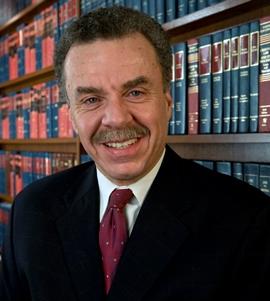Columbia Law School Students Choose Conrad Johnson as 2013 Professor of the Year
Leading Expert on Technology and Access to Justice to Receive Willis L.M. Reese Prize for Excellence in Teaching at Graduation Ceremony on May 23, 2013
New York, May 1, 2013—Professor Conrad Johnson, a leading expert on innovative legal education, technology in law practice, and law school diversity, will be awarded the Willis L.M. Reese Prize for Excellence in Teaching by the members of the Class of 2013 at their May 23 graduation ceremony.
As a clinical law professor especially interested in how technology can best be used to advance access to justice in the courts and enhance public interest legal practice, Johnson has spent more than two decades training students to become effective advocates.
| Professor Conrad Johnson |
Johnson co-directs the Lawyering in the Digital Age Clinic, which explores the impact of technology on law practice and the legal profession. Under Johnson’s direction, clinic students have created a wide variety of innovative technological solutions for prominent jurists and public interest legal organizations, including two of New York’s chief judges, The Legal Aid Society, Legal Services NYC, the Judicial Institute, the New York City Office of Administrative Trials and Hearing, the Civil Court of the City of New York, and the City Bar Justice Center. Their work has benefited thousands of people in crisis, including those affected by the September 11, 2001, terrorist attacks and residents of neighborhoods decimated by Hurricane Sandy.
The clinic pioneered the use of technology to assist advocates in delivering services and in tracking systemic problems quickly. Johnson was instrumental in the creation of a web-based tool that helps judges, prosecutors, and defense attorneys understand the additional consequences of criminal convictions. The Collateral Consequences Calculator is a first-of-its-kind, free online resource that, in the words of New York’s Chief Judge Jonathan Lippman “is a remarkable, innovative tool that will help defense counsel, prosecutors, and judges identify the often unseen but potentially devastating consequences of criminal charges.”
The Lawyering in the Digital Age Clinic also produced a landmark study that showed a marked decrease in the enrollment of African-American and Mexican-American students in U.S. law schools during a 15-year period.
This past year, the clinic provided support to Legal Services NYC in the aftermath of Hurricane Sandy. With Johnson’s leadership, students created an online intake system that enables lawyers to guide residents through the Federal Emergency Management Agency’s claims process and direct them to other supportive services.
Johnson, whose family has deep roots in Harlem, graduated from Columbia University in 1975 and earned his J.D. from Brooklyn Law School in 1978. He began his career at The Legal Aid Society’s Harlem office. Driven by the desire to ensure community access to legal services, Johnson spent 12 years with the organization and eventually became the attorney-in-charge at that office.
While working at The Legal Aid Society, Johnson began teaching twice a week at Malcolm-King College on 125th Street in Manhattan. “[Teaching] was another way to reach people in the community,” he said. “Even after a long day of lawyering, the time I would spend at Malcolm-King College energized me.”
Johnson taught as an assistant professor at the City University of New York School of Law for two years before joining the Columbia Law School faculty in 1989. A leader in the field of civil litigation, he served as the director of clinical education from 1992 to 1996 and, for 11 years, led the Law School’s Fair Housing Clinic, which specialized in civil rights litigation.
Johnson co-founded the Lawyering in the Digital Age Clinic in 2001 with Professor Mary Marsh Zulack and Brian Donnelly, who serves as Columbia Law School’s director of educational technology. “We became the first clinic in the country to focus exclusively on the impact of technology on law practice and the profession,” Johnson said. “It was clear that technology afforded us an advantage in supervision, teaching, and lawyering. We realized that technology would change law practice and understood that public interest legal organizations and the courts would need help integrating technology into their services. Similarly, we felt a responsibility to provide our students with a structured appreciation for how to use the powerful tools of technology in thoughtful ways throughout their careers.”
# # #
NOTE: The Columbia Law School graduation ceremony takes place on Thursday, May 23 at 3:30 p.m. EDT on the South Field of the main Columbia University campus, in front of Butler Library. In addition, the Law School will be holding a small reception for graduates and their families following the ceremony.
